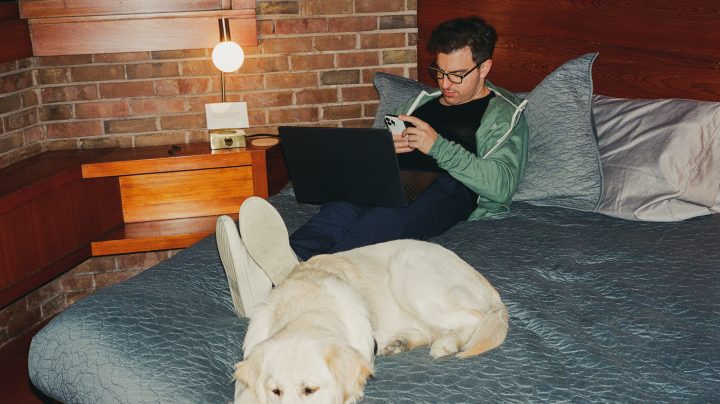
Airbnb’s Brian Chesky on repositioning the company for a new era of travel
Airbnb’s Brian Chesky on repositioning the company for a new era of travel

Airbnb announced several updates to its platform today. The company says redesigns to search and a new feature allowing people to split up long stays are part of “the biggest change to Airbnb in a decade,” brought about in response to pandemic-era trends enabling more people to blend work and travel.
Though Airbnb was hit hard by the early months of the pandemic, the company has benefited from those shifting trends over the past two years. In a quarterly earnings announcement last week, Airbnb said total bookings have now surpassed pre-pandemic levels and long-term stays (lasting 28 days or more) have doubled since 2019.
Brian Chesky, Airbnb’s co-founder and CEO, spoke with “Marketplace” host Kai Ryssdal about the company’s decision to allow employees to “live and work anywhere” while maintaining their current salaries and Chesky’s own announcement that he is now “living on Airbnb.” The following is an edited transcript of their conversation.
Brian Chesky: For the past two years, Airbnb has been remote. I’m 40, I live with nothing but a golden retriever. She’s got flexibility, I’ve got flexibility, and I figure, life’s short, I want to see a little more of the country. And so, for the last four months I’ve hopped around, I’ve stayed in probably a dozen Airbnbs and saw a bunch of the country. It’s been a lot of fun and it’s been a great experience.
Kai Ryssdal: Alright, so there’s a lot to unpack there. But first of all, how’s the dog doing? How does she like moving every couple of weeks?
Chesky: She seems to like it, you know, I do my best to communicate. We pick homes with yards and she likes it. It’s a lot of fun and it’s been a great experience.

Ryssdal: Are you booking your own stays through the app? Or do you have people who do that for you?
Chesky: I book it. And I don’t tell them who I am, although I don’t use a pseudonym either, so I’d say, half the time, they figure out it’s me, half the time they don’t. And it’s great because you kind of see all the good and, occasionally, not as good about your product, and that’s exactly how you get the feedback. I also just think that anecdotes and firsthand experiences are often more helpful than just data alone.
Ryssdal: I want to get to the announcement you made about Airbnb people being able to be full-time remote in a second, but I want to back you up for a minute to the beginning of this pandemic, when you and this company, you had what has to be an existential crisis. And I’d like you to reflect for a second on: Here we are two years later, and it looks like you made it. How’d you do that?
Chesky: Oh, God. Well, Kai, let me just first say I’m 40 years old, but I feel like I’m going on 50 or 60 after the last two years. You know, I’ve been lucky in my life never to have had a near-death experience. I’ve heard them described to me as like, your life flashes before your eyes, and sometimes people describe that experience as giving them clarity. I certainly had what felt like a near-death business experience, because our business dropped 80% in eight weeks. And, by the way, when your business drops 80% in eight weeks, you don’t know if that’s the end or not. It could have dropped by 99%. And it was like an 18-wheeler on a highway going 80 miles an hour and then you slam on the brakes. It’s very traumatic.
I remember March 15 — that’s the Ides of March — we had a board meeting. And after the board meeting, I had a board member call me, he was a former CEO of Amex, and he said, you know, “This is your defining moment as a CEO.” And it was kind of like this bell in my head just rung and it was just kind of “Yes, this is it. This is the moment of truth for me, and this is the moment of truth for the company.” And we kind of got in the foxhole and we kind of rebuilt the company from the ground up. We had to make a lot of painful decisions. We laid off 1,900 people. We shuttered most of our new initiatives. And something remarkable happened. People, even though they weren’t crossing borders and they weren’t traveling for business, they were getting in their cars and they were traveling, a tank of gas from their house, to stay in Airbnbs. And we were able to pivot the product to take advantage of that opportunity. I guess you could say we never looked back after that.
Ryssdal: I mentioned that we’re on a Zoom, which I don’t usually do — I don’t usually see the people I interview — and It’s interesting that during that whole answer, your head was down, you were scratching your forehead, you weren’t looking up. It was just interesting to see.
Chesky: Well, I will tell you that there are a lot of emotions that flood my mind as I think about that period, I mean, both good and painful. You know, it was the most defining year, 2020, of my life. I didn’t think that would be possible after starting Airbnb. I kind of told myself at that time, like, “This is the craziest thing I’ll ever go through.” Little did I know what was in store for me in 2020.
Ryssdal: All right, super quick couple of more things and then I’ll let you get back to running the company. Big announcement from you guys last [month]: Everybody at Airbnb can be remote, wherever they want, for as long as they want. You know, there are gonna be some in-person gatherings, but basically, wherever you want to live and work, you can live and work. That’s a reasonable decision for you, as a CEO of a company, I imagine, because that’s what people want now, but also a reasonable decision for you as the CEO of Airbnb, for whom this future workforce is tailor-made.
Chesky: 100%. I mean, listen, there were two reasons I did this. One, because it benefits our business to do this. If we can embrace remote work, and more people are living and working in Airbnbs, and then we can popularize this for other companies, that’s good for our business. But I will tell you if we didn’t benefit at all, I still would have done it, because, number one, we had the most productive two years in our history while working remotely.
Point two: I generally like to predict the future by not looking at what bigger or mature companies do but what young companies do. Twenty years ago, it was young Silicon Valley startups that popularized open floor plans, you know, in-person perks and all those different perks. And I think, if you look at the young companies today, they’re embracing flexibility and remote work. And the third thing is, it just seems like the best people now live everywhere. I think the best people aren’t just in Silicon Valley and we decided, let’s not lower people’s pay if they move from San Francisco to Ohio. Let’s just try to be a little more ahead of the curve, here.
Ryssdal: Well, so about that pay thing, which is the other thing I wanted to ask you. So that’s great for Airbnb workers, but what do you say to somebody in, you know, Ottumwa, Iowa who’s trying to buy a house or whatever, and you’ve got people coming in making Silicon Valley salaries, when that’s not the prevailing wage in that area? I mean, that seems to be a challenge, and doesn’t do much for the other parts of this economy besides Airbnb.
Chesky: Well, actually, I mean, I can’t speak for every city, but I think a lot of cities and a lot of mayors would like to have high-wage workers and high tech people come into their city. They patronize, they can provide more revenue for their markets. I will also say, I don’t think they’re going to be flooding any one area. What we’ve generally seen with our data at Airbnb, is there’s this mass population redistribution. It used to be that people are really concentrated in certain cities (San Francisco, New York, LA) and now they’re kind of spreading out to thousands of towns and communities. But I also think cities can decide, based on their own policies, who they want to live there and who they don’t.
Ryssdal: Do you think you’re, you know, look, you’re a big-name company and you’re a big-name guy. Do you think you’re setting a trend, here, for this fully remote workforce?
Chesky: Maybe setting a trend is a slight overstatement, but I do think we’re popularizing or accelerating a trend. I mean, certainly, since we made that announcement, we’ve had more than 1 million visits to our careers and jobs page. Now, we only have 6,000 employees and we’re not hiring that many people. So I don’t know, I think just as just an indication that we tapped into something, that this is what the people want. And I think this is inevitable because I think, after compensation, flexibility will probably be the most important benefit that employers will be giving to employees. That’s my prediction.
There’s a lot happening in the world. Through it all, Marketplace is here for you.
You rely on Marketplace to break down the world’s events and tell you how it affects you in a fact-based, approachable way. We rely on your financial support to keep making that possible.
Your donation today powers the independent journalism that you rely on. For just $5/month, you can help sustain Marketplace so we can keep reporting on the things that matter to you.


















